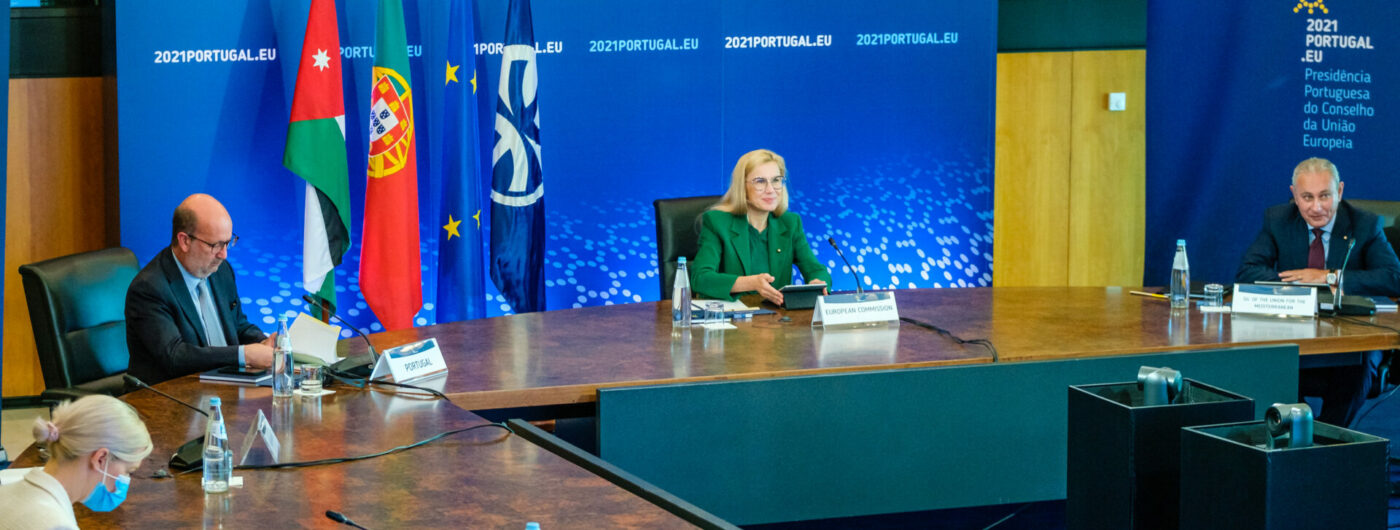
UfM Ministers announce reinforced cooperation on ambitious targets for energy sustainability in the Mediterranean
- The Ministers of the Union for the Mediterranean (UfM) in charge of Energy gathered for their Third Ministerial Conference on Energy in Lisbon on 14 June 2021. Energy Ministers from the 42 UfM Member States met to discuss regional cooperation towards energy security and a low-carbon transition.
- With a population of over 500 million inhabitants and growing, it is estimated that energy demand in the region will increase by more than 50% by 2040.
- Ministers adopted a new Ministerial Declaration, which will be developed into concrete action plans by the three UfM Energy Platforms, which act as fora for dialogue bringing together relevant stakeholders and organisations from across the region.
14 June 2021. The UfM Ministerial Meeting on Energy was held today, co-chaired by Hala Zawati, Minister of Energy and Mineral Resources of the Hashemite Kingdom of Jordan, and Kadri Simson, Commissioner for Energy, for the European Union, in the presence of Nasser Kamel, Secretary General of the UfM Secretariat, and hosted by João Pedro Matos Fernandes, Minister of Environment and Climate Action of the Portuguese Republic.
The meeting culminated in a Joint Ministerial Declaration, in which all UfM Member States agreed to join efforts to address the region’s energy challenges, and to promote a sustainable and inclusive recovery from the COVID-19 pandemic. The Ministerial Declaration raises the ambition of the region to contribute to a green, just and fair energy transition and untapping all the existing opportunities, in line with the climate goals.
Kadri Simson, Commissioner for Energy: “We are at a pivotal moment in our fight against the climate crisis. Without policy change, the Mediterranean region will be 2.2 degrees warmer than pre-industrial times by 2040. To limit global warming, we urgently need to be more energy efficient, while increasing the use of clean energy in all sectors, including transport, industry and heating and cooling. The declaration adopted today sends a powerful signal and shows the willingness of the region to work together towards a clean energy transition.”
Hala Zawati, Minister of Energy and Mineral Resources of the Hashemite Kingdom of Jordan: “The UFM Ministerial declaration on Energy will be a key catalyst in enhancing cooperation between our member states. It will help us realize our collective vision of expanding the reach of renewable energy and energy efficiency. It will also enhance cooperation of electricity exchange and stable supply of natural gas throughout the North and South Mediterranean Basin region. We are hopeful that the declaration will help promote equitable and sustainable growth that would directly spill over into post-pandemic recovery.”
João Pedro Matos Fernandes, Minister of Environment and Climate Action of the Portuguese Republic: “I am pleased to meet today with the Energy Ministers of the Union for the Mediterranean to discuss common challenges in the field of energy, such as promoting energy from renewable sources, energy efficiency and joining efforts towards the decarbonisation of the energy system. With today’s event we reinforce the commitment to accelerate the necessary changes towards more sustainable and efficient economies and societies.”
UfM Secretary General Nasser Kamel said: “The UfM is acutely aware of the urgent energy challenges facing the Mediterranean today, and of the pressing need to step up regional cooperation and collaboration in order to address them. Today, UfM countries have reaffirmed their common goal and shared commitment to pushing forwards a fair, sustainable transition towards circular, low-emission, inclusive, efficient and resilient economies and societies.”
Further pressure is added by intensive industrialisation, tourism development, and the increasing effects of climate change. However, the region’s wealth of renewable energy sources such as sun, wind and water mean that solutions can be found for a transition to sustainable, low-carbon energy supply. Concentrated solar plants could generate 100 times the electricity needs of the MENA and EU put together – though currently issues in investment and infrastructure connectivity are holding the region back.
The main priorities for the region highlighted in the Declaration include: the gradual integration of energy systems and markets while ensuring the security of energy demand and supply; the reinforcement of electricity interconnections and smart grids; an ambitious promotion of energy efficiency; the need to take appropriate actions to attract private investments in sustainable renewables and in energy efficiency; the role of research and development, innovation and digitalization in supporting the transition towards fair, inclusive, resilient and low-emissions as well as resource-efficient economies and societies.
The declaration also states its support to the UfM Energy Platforms, the main dialogue forum in the region, and mandates to elaborate a strategic Roadmap for Action that will include concrete activities to implement the objectives of the declaration: the UfM Regional Electricity Market Platform, the UfM Renewable Energy and Energy Efficiency Platform, and the UfM Gas Platform.
Key energy projects supported by the UfM include:
- SEMed Private Renewable Energy Framework “SPREF” aims to break down barriers preventing the development of private renewable energy markets in Morocco, Tunisia, Egypt, Jordan and Lebanon.
- CLIMA-MED, which seeks to enhance energy security and the adaptive capacity of partner countries while encouraging their transition to low carbon and climate-resilient economies.
- The Tafila Wind Farm, a ground-breaking project in privately-funded renewable energy that aims to cover 3% of Jordan’s national electricity demand, as well as creating substantial jobs.
More information
- 3rd UfM Ministerial Declaration on Energy – 14th June 2021
- 2rd UfM Ministerial Declaration on Energy – 1st December 2016
- UfM Energy and Climate Action division

